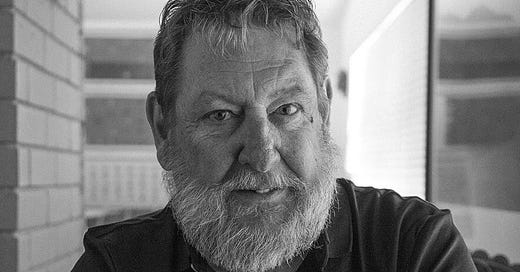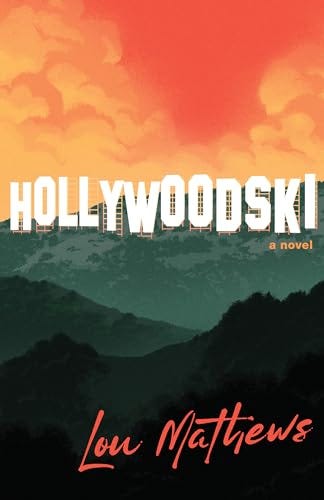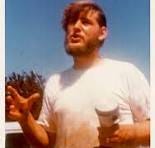THE LONG FADE OUT - Interview with Lou Mathews and his most recently published book 'HOLLYWOODSKI'
If you haven't heard of Lou Mathews - Now is your opportunity..
Lou Mathews - Hollywood
From his Beachwood Canyon home, the Los Angeles novelist discusses "Hollywoodski," a forty-year literary project that captures the city's dreamers, schemers, and survivors
Interview by Buzz Langton
It's 10 A.M. in Bangkok when Lou Mathews appears on my screen from his Beachwood Canyon home, where it's 8 P.M. The monsoon rain hammers against my windows as we settle into a cross-continental conversation about "Hollywoodski," his novel-in-stories published in January after decades in the making.
At seventy-eight, Lou Mathews is a fourth-generation Angeleno whose white beard and measured cadence suggest a man who has observed much and spoken carefully about it. "I was born in Glendale," he tells me, referencing notes from my notebook. "My California family dates back to the Gold Rush days."
Lou Mathews Los Angeles credentials run deep, lending authenticity to "Hollywoodski," which chronicles screenwriter Dale Davis's forty-year journey through the entertainment industry's boom-and-bust cycles. The book's fifteen interconnected stories track Dale Davis from promising newcomer to embittered veteran to reluctant sage, a trajectory familiar to many on Hollywood's margins.
"I describe Los Angeles as 'the city of a thousand villages,'" Mathews says, a phrase I notice appears both in my interview notes and in the novel itself. "It takes so long to learn the place."
As editor of One Create Magazine in Bangkok, I'm drawn to parallels between Thailand's labyrinthine capital and Los Angeles—both cities where ancient and modern, traditional and avant-garde, coexist in uneasy proximity. When I mention Thai Town, located about a mile and a half from Mathews' home and celebrated for having some of the most authentic Thai cuisine outside Thailand, he acknowledges the city's multicultural tapestry.
This patchwork quality extends to "Hollywoodski," whose stories span diverse Los Angeles micro-cultures. From Hollywood dive bars to Nicaraguan film sets to elite Westside mansions, Davis navigates worlds that exist side by side yet rarely intersect.
Mathews' own Beachwood Canyon story includes unexpected characters. When he and his wife, Alison (a poet and retired lawyer, according to my notes), moved into their apartment in the early 1980s, they were startled by their property manager—a punk in leather pants and jacket, oddly watering plants.
"This was Miguel Sandoval," Mathews explains, referring to the now-established character actor known for roles in films like "Jurassic Park" and series including "Medium." "We thought we'd made a mistake moving in—this strange punk managing the property. How wrong we were." The anecdote exemplifies the unexpected connections that define Los Angeles and populate Mathews' fiction.
"Hollywoodski" itself had an appropriately Hollywood-esque development hell. "The first story in the book was written probably thirty-five or forty years ago," Mathews explains. That story, "Individual Medley," appears in the collection as one supposedly written by protagonist Davis himself.
"I didn't know at that point there was a book," he continues. "I just kept writing these stories, publishing them in places like ZYZZYVA, New England Review, and Black Clock."
The turning point came after writing "Some Animals Are More Equal Than Others," in which Davis co-writes and directs a doomed remake of Sam Peckinpah's cult film "Bring Me the Head of Alfredo Garcia." This mirrors Mathews' own brief foray into screenwriting.
"I loved taking apart that script and rewriting it," he acknowledges, "but I had no patience for what came next. It took too long to get answers because of the money involved. I was spoiled by the godlike powers you have writing fiction and plays, where there's far less money but far more freedom."
According to my notes, this experience marked a fork in Mathews' professional road. While he could have persisted in Hollywood, he instead chose literature, publishing the novels "L.A. Breakdown" (1999) and "Shaky Town" (2021), alongside teaching at UCLA Extension since 1989, where he was named "Teacher of the Year" in 2002.
"After writing the Alfredo Garcia story," Mathews explains, "I realised these pieces were becoming a progression. I then knew there was a book there and knew the stories that had to be written. But assembling it just took a long, long time—probably a ten-year period. The last four or five stories, which form a kind of patchwork filling in the gaps, were written in the last year."
Mathews' pre-literary career included stints as a car mechanic and street racer—experiences that informed "L.A. Breakdown," which the Los Angeles Times named a "Best Book" of 1999. Looking at my notes, I see "Ken Kissey—stalwart—some/same pencil" written beside "acid pencil" and "Ellen Chadwick—organic garden maven," suggesting influences and contemporaries from this period.
He specialised in British cars, which led to an unusual inheritance: he was given—or as he puts it, "left with"—three or four 1959 Rileys, notable for being the only year that model was sold in the United States. This mechanical expertise and specific knowledge of automotive subcultures gives his writing the gritty authenticity that critics have praised.
"Hollywoodski" centres on Bowdler's, a fictional bar inspired by Hollywood establishments like the Frolic Room and Power House. It's where Davis and his companions—fellow industry outcasts Oscar Grunfeld and Jaime Rubin—nurse drinks and trade stories. Their conversations form the book's emotional core, a chorus delivering cynical wisdom and improbable tales that reveal the industry's absurdities.
"I have a bunch of friends who had a hit and have sort of lived on that," Mathews notes when discussing these characters' inspirations. "But it's such a strange business. I look at friends who made the wrong choice, who turned down the low-budget independent gig to take the high-priced job—and the low-budget gig turned out to be a 'Drugstore Cowboy' or 'Reservoir Dogs,' while the high-paying gig turned out to be something that came and went. That happens a lot."
While Davis isn't based on any specific screenwriter, Mathews explains he's "more of an amalgam" of figures he's encountered throughout his decades in Los Angeles—particularly during his eight-year stint as a contributing editor and restaurant reviewer for L.A. Style magazine, positions noted in the documents from UCLA Extension.
Mathews studied under Raymond Carver during his M.F.A. program at UC Santa Cruz, graduating in 1972—an experience that shaped the economical prose style evident in "Hollywoodski." "I think about stories for a long time before I write them," he explains, "but the writing process is fairly fast once I start. There's very little editing; most of the time it's cuts. I really like taking things down to the bone."
He describes himself as "something of a miniaturist," a characterisation that appears in my notes and perfectly captures the precision of his writing. This lean approach defines "Hollywoodski," whose characters often communicate through movie references—a language Mathews speaks fluently.
As we discuss his economical prose, I note parallels between Mathews' style and that of Belgian journalist-turned-novelist Georges Simenon, famous for his lean, unadorned writing and keen observational eye. Mathews nods appreciatively at the comparison. Both writers strip language to its essentials, allowing character and setting to emerge through carefully selected details rather than elaborate description. Like Simenon's Paris or Liège, Mathews' Los Angeles becomes a living entity through precise, atmospheric brushstrokes rather than panoramic views.
Looking at my notes, I see "theme/stance—out there" with an arrow pointing to "creative community" and "if people don't like the answer, change the question"—phrases that capture both Hollywood's collaborative spirit and its slippery relationship with truth. The title story alone references dialogue from "Joan of Arc" (1948), "The Hustler" (1961), and "In the Heat of the Night" (1967), alongside mentions of "Easy Rider," the 1976 "King Kong" remake, and "Two-Lane Blacktop."
Among Mathews' playwriting credits, according to my notes, are "Rancho Alisos," "A Curse on Chavez Ravine," "You Did Some Good Work Once," "Jaws of Life," and a radio play called "Captain Manners." His first full-length play, "The Duke's Development," won second prize in the 2000 National Repertory Theatre Foundations National Playwriting Contest—experiences that informed his creation of Davis's dialogue and narrative voice.
Throughout his career, Lou Mathews has accumulated numerous accolades, including a National Endowment for the Arts Fellowship in Fiction, a California Arts Council Fiction Fellowship, a Pushcart Prize, and a Katherine Anne Porter Prize—credentials that belie the book's themes of creative perseverance despite institutional rejection.
Looking ahead, Mathews mentions several projects, including a short story that has challenged him for three decades: "The Death of a Democrat." With characteristic dry humour, he adds, "That's particularly appropriate right now, don't you think?"
In "Hollywoodski," Mathews has created what critics are positioning as an essential addition to the pantheon of Hollywood fiction, standing alongside works by Nathanael West and F. Scott Fitzgerald in its portrayal of the dream factory's disillusionment and persistent hope. The book spans from 1967 to 2007, tracking both Davis's personal journey and the industry's evolution from the final days of old Hollywood through the corporate takeover era.
As the monsoon in Bangkok intensifies and night settles more deeply over Beachwood Canyon, our conversation draws to a close. The video connection falters briefly before stabilising to reveal Mathews against a backdrop of bookshelves laden with decades of reading—evidence of a life dedicated to literature rather than screenwriting's fleeting rewards.
"Hollywoodski" joins Mathews' earlier works in capturing Los Angeles in all its contradictory glory—a city of dreams and disappointments, of villages within villages, where the line between success and failure often depends more on timing and connections than on talent. It's a testament to those who continue telling stories despite rejection and setbacks, finding meaning in the attempt rather than commercial success—much like its author.
Published by Tiger Van Books Purchase at your local / online book store. To order direct from Tiger Van Books Please use this LINK
Link here for HOLLYWOODSKI which is now available on Amazon and all good book stores.
To order direct from Tiger Van Books use this link







